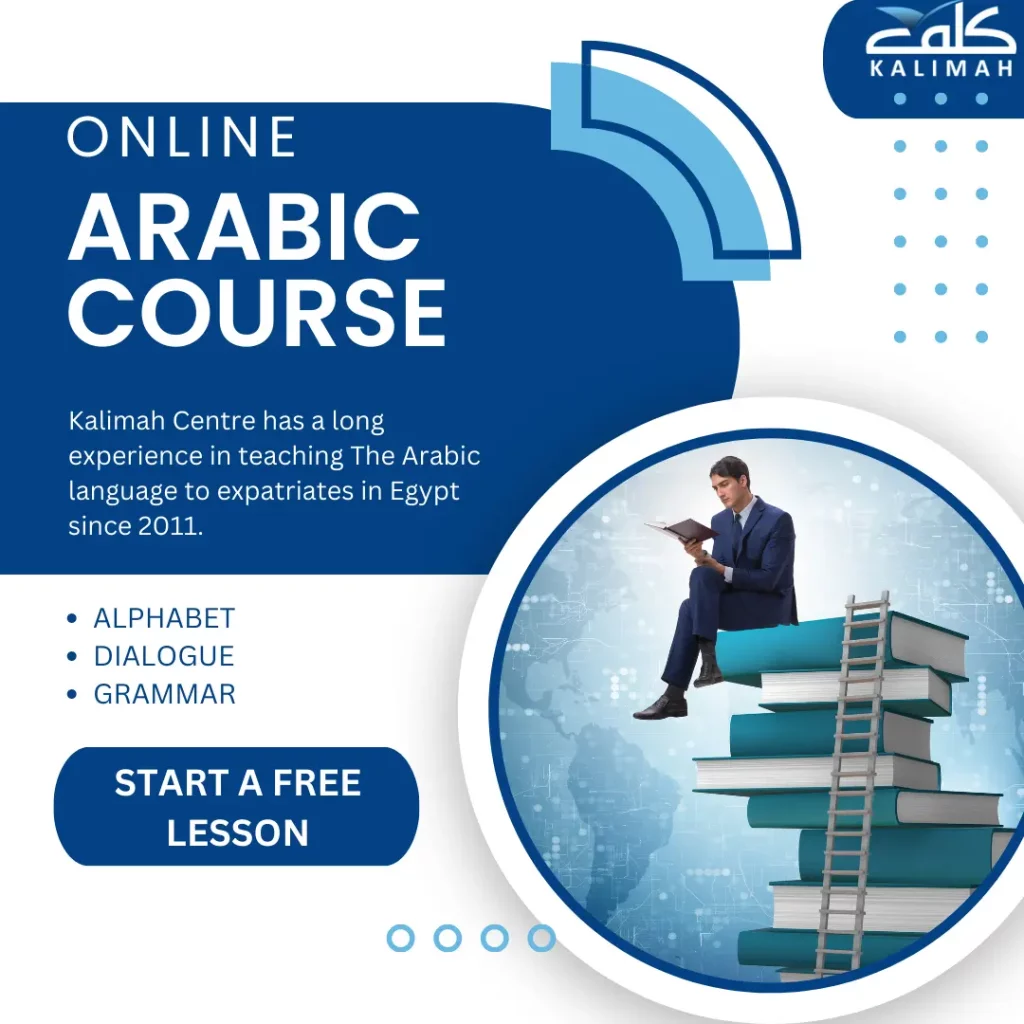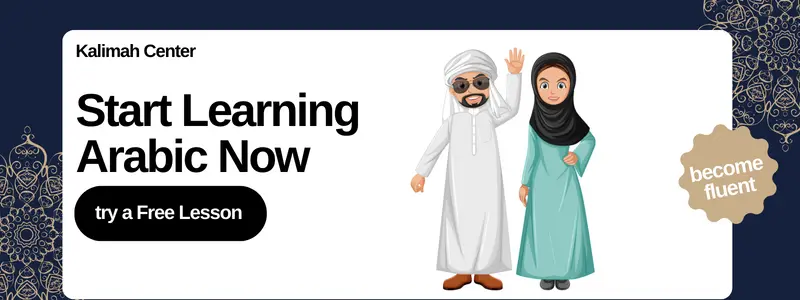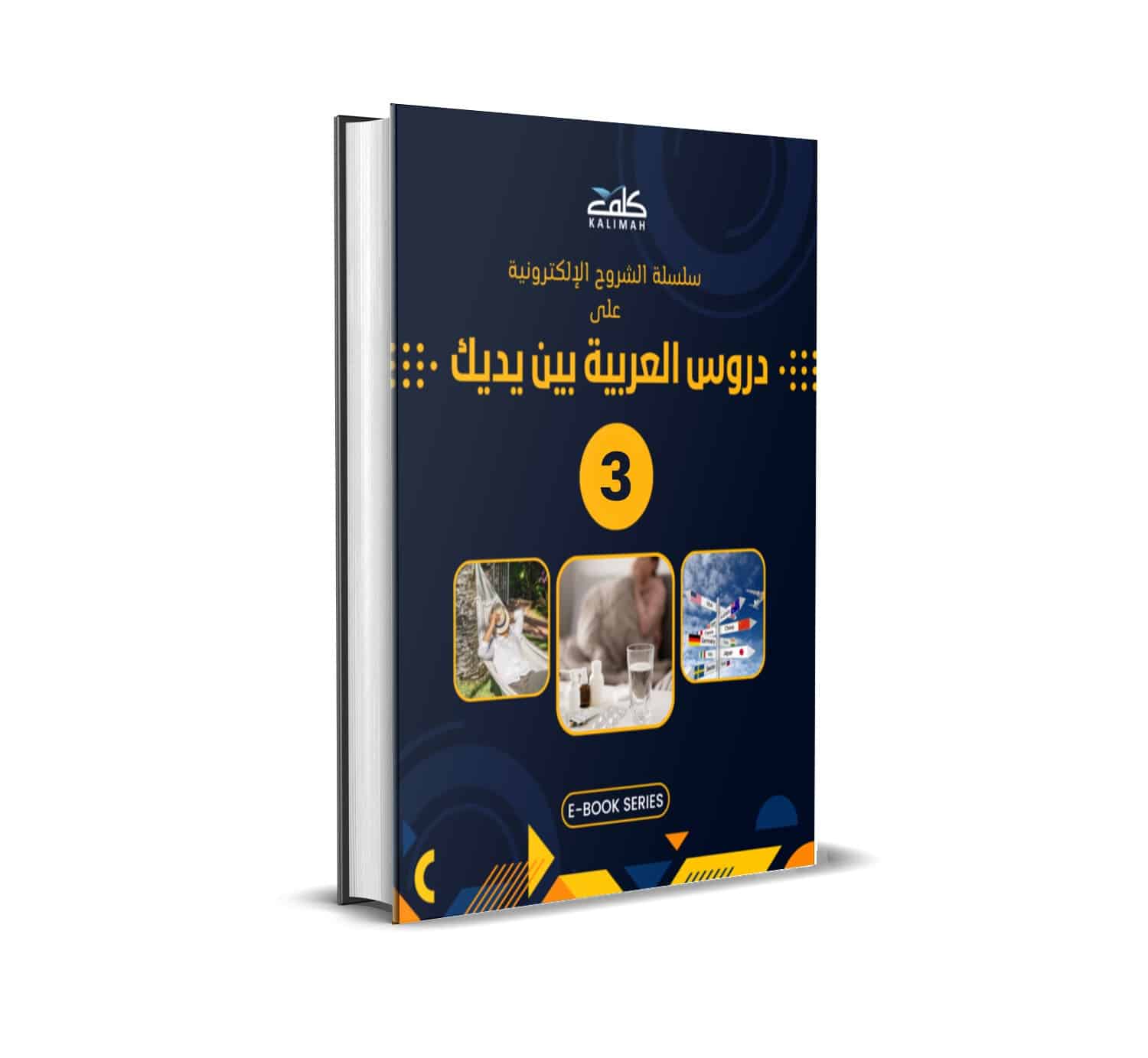In a nutshell: Learning Classical Arabic immerses you in the beauty of this ancient language, from mastering the alphabet and grammar to exploring sacred texts and poetry. With expert native teachers and a structured, personalized approach, you’ll gain fluency while connecting with a rich cultural and historical heritage—opening doors to both Classical and Modern Arabic.
Are you ready for a linguistic journey that takes you to the roots of one of the world’s oldest and most beautiful languages?
At Kalimah Center, we believe that learning classical Arabic is not just about mastering a language; it’s about connecting with a rich cultural heritage, a profound history, and a way of life that has shaped civilizations for centuries.
Our programs are designed to help you discover the beauty, depth, and versatility of classical Arabic in an immersive and engaging way.
What is Classical Arabic?
Classical Arabic, also known as Fus’ha (الفصحى), is the form of Arabic found in the Quran, classical literature, and historical texts. Unlike Modern Standard Arabic (MSA), which is used in the media and formal communication today, Classical Arabic carries the depth, beauty, and poetic richness of ancient texts. It is a language that transcends time, offering a direct connection to the words of great scholars, poets, and the Quran itself.
By learning Classical Arabic, you are not just learning to communicate; you are diving into the very essence of Arabic civilization. You’ll be able to understand sacred texts, explore the works of great philosophers, and appreciate the nuances of Arabic poetry and prose that have been admired for generations.

Fundamentals of Classical Arabic
To truly understand Classical Arabic, you must grasp its core elements:
1. Classical Arabic Alphabet
The foundation of learning any language starts with its alphabet. In Classical Arabic, the alphabet consists of 28 letters, each with its own unique sound and form. Learning the script is essential for reading the Qur’an and other classical texts.
At Kalimah Center, we offer specialized courses that focus on mastering the Classical Arabic alphabet using unique resources like our book, Iqraa (اقرأ), which is designed to make learning efficient and enjoyable.

2. Classical Arabic Grammar
Grammar is the backbone of classical Arabic. Unlike spoken dialects or even Modern Standard Arabic, classical Arabic follows a strict grammatical structure that affects how sentences are constructed, how words are formed, and how meanings are conveyed. Key grammatical concepts include:
- Nahw (النحو): The rules governing sentence structure.
- Sarf (الصرف): The study of word forms and conjugations.
Our Arabic Language curriculum at Kalimah Center includes a comprehensive exploration of these topics ensuring you understand the deeper mechanics of the language.
3. Classical Arabic Books
To master classical Arabic, reading is essential. We introduce students to classic texts such as the Qur’an, Hadith collections, and works of early Islamic scholars.
These books are not only foundational to Islamic knowledge but also rich in linguistic variety, offering invaluable practice in understanding classical Arabic in its purest form.
4. Classical Arabic Vocabulary
When learning classical Arabic, it’s crucial to familiarize yourself with frequently used words and phrases. Examples include:
- Allah (الله): God
- Rasul (رسول): Messenger
- Salah (صلاة): Prayer
- Ilm (علم): Knowledge
- Quran (قرآن): The Holy Book of Islam
- Sunnah (سنة): The teachings and practices of Prophet Muhammad
- Hadith (حديث): A record of the sayings or actions of Prophet Muhammad
- Dunya (دنيا): This world, the temporal world
- Akhirah (آخرة): The Hereafter, the afterlife
- Jannah (جنة): Paradise
- Jahannam (جهنم): Hellfire
- Tawheed (توحيد): The oneness of God, monotheism
- Iman (إيمان): Faith, belief
- Ihsan (إحسان): Excellence, perfection in worship
- Taqwa (تقوى): God-consciousness, piety
- Dua (دعا): Supplication, prayer
- Sabr (صبر): Patience, forbearance
- Shukr (شكر): Gratitude, thankfulness
- Tawakkul (توكل): Reliance on God, trust in God
- Ummah (أمة): The Muslim community, the nation
By learning these core words, you build a solid foundation that supports further vocabulary expansion.
Best Classical Arabic Learning Curriculum
Our Classical Arabic summer programs provide a comprehensive curriculum, meticulously crafted to cover everything from the fundamentals to advanced topics. Here’s what you can expect:
1. Master Classical Arabic Phonetics
Start with the basics by learning the unique sounds of classical Arabic. You’ll learn how to pronounce each letter correctly, understand its various forms, and practice through guided exercises.
Our teachers will provide you with valuable tips on mastering the pronunciation of letters such as “ث” (tha) and “ق” (qaaf), which are essential for accurate recitation and understanding of classical texts.
2. Grasp Classical Arabic Grammar
Dive into the rich grammar of classical Arabic, exploring structures like المفعول به (the object), المبتدأ والخبر (the subject and predicate), and other foundational rules.
This course is based on the classical text “Ajurrumiyyah,” a time-honored guide that simplifies grammar in an accessible way. You’ll also learn how to construct sentences and understand their meanings deeply.

3. Read and Understand Classical Texts
Want to read and understand classical Arabic literature, Islamic texts, or poetry? Our course will guide you through these treasures step-by-step. We use carefully selected excerpts from classical works, including the Quran, to teach reading comprehension and contextual understanding.
Example: Surah Al-Fatiha (الفاتحة) You’ll learn the correct pronunciation, explore the linguistic beauty of its verses, and understand its profound meaning.
4. Develop a Rich Vocabulary
To master Classical Arabic, you need a strong vocabulary. Our program emphasizes learning the roots of words, which helps you understand their meanings and how they are used in various contexts. You’ll learn essential words such as “العلم” (al-ilm – knowledge) and “الحق” (al-haq – truth), words that appear frequently in classical literature and religious texts.
Read more about Should I Learn Arabic Or Farsi?
Why Choose Our Classical Arabic Learning Programs?
At Kalimah Center, we believe that learning Classical Arabic should be an enriching experience, filled with discovery and growth. Here’s what makes our programs stand out:
1. Expert Native Teachers
Our teachers are native Arabic speakers who bring a deep understanding of Classical Arabic to their teaching. They are well-versed in both the language and its cultural context, ensuring that you learn not just how to read and write, but also how to think and feel in classical Arabic. With their guidance, you’ll discover the beauty of this ancient language.

2. Comprehensive and Unique Curriculum
Our summer programs cover all aspects of classical Arabic: phonetics, grammar, reading, writing, and comprehension. You’ll start with the fundamentals and gradually build up to more complex topics. You’ll learn how to read classical texts fluently, understand complex sentences, and express yourself with confidence.
3. Bridge the Gap to Modern Arabic
While Classical Arabic may seem distant, it’s the foundation for all modern dialects. Our programs will equip you to understand and appreciate the rich tapestry of Arabic language and culture, opening doors to communication and connection across the Arab world.
Meet Our Passionate Teachers
Our teachers at Kalimah Center are not only experts in Classical Arabic but also passionate educators who bring this beautiful language to life. They will guide you through every step of your journey, ensuring that your learning experience is both challenging and rewarding.
Here are Some of Our Experienced Teachers that you can meet through your learning journey:
1. Mousa Shawkat
With over 18 years of experience teaching Arabic to non-native speakers, Mousa Shawkat is adept at tailoring his approach to suit your individual needs and learning style. His classes are known for their fun and engaging atmosphere, making learning Arabic a delightful experience.
2. Hamada Mohamed
Hamada Mohamed is a passionate educator with over 10 years of experience, Hamada’s love for the Arabic language is contagious. He finds immense joy in witnessing his students’ progress and takes pride in helping them achieve fluency.

3. Hussein Al-Sabbagh
Hussein Al-Sabbagh‘s meticulous approach to teaching, honed over 8 years of experience, ensures a structured and communicative learning experience. He is committed to helping you save time and effort in your studies while achieving your language goals.

4. Angham Abdel Haleem
Angham Abdel Haleem is a versatile educator with a background in Arabic language, Islamic sciences, and educational counseling, Angham brings a holistic approach to her teaching. Her experience with diverse learners and innovative teaching methods ensures engaging and effective lessons tailored to your individual needs. She is particularly passionate about teaching children and fostering their love for the Arabic language and Islamic values.

5. Marwa Naser
Marwa Naser‘s passion for the Arabic language shines through in her teaching. She possesses a remarkable ability to simplify complex concepts, making Arabic accessible and enjoyable for learners of all levels. Her dedication to promoting classical Arabic understanding fuels her commitment to helping students achieve fluency.

6. Fatimah Jamal
Fatimah Jamal‘s background in Al-Azhar University, combined with her experience learning German as a foreign language, gives her unique insights into the challenges and joys of language acquisition. Her classes are interactive, fun, and utilize technology effectively.
Each lesson at Kalimah Center is carefully designed to be engaging, interactive, and tailored to your individual pace and learning style. Our teachers are committed to providing you with the support and guidance you need to succeed in your Arabic language journey.
How to Learn Classical Arabic?
Embarking on your journey to learn Classical Arabic requires dedication, passion, and the right resources. Here’s how you can get started:
1. Enroll in a Classical Arabic Course
At Kalimah Center, our Classical Arabic courses are designed to guide you step-by-step from the basics to advanced levels. Whether you’re a beginner or have some prior knowledge, our courses provide structured learning, tailored materials, and interactive sessions with native Arabic teachers. We offer online and in-person classes, so you can learn at your own pace, wherever you are.
2. Practice Classical Arabic Writing
Writing is an essential skill in learning Classical Arabic. Practice by copying texts from classical books, such as the Quran or Hadith collections. Pay special attention to the diacritical marks (harakat) that affect pronunciation and meaning. Our courses include writing exercises, dictation sessions, and regular feedback to help you improve your writing skills.
3. Study Classical Arabic Grammar and Vocabulary
Dedicate time daily to studying grammar rules and expanding your vocabulary. Use trusted grammar books such as ‘Sharh Ibn Aqil’ and vocabulary lists provided in our course materials. Practice reading aloud, repeating phrases, and engaging in conversation to reinforce your learning.
4. Immerse Yourself in Classical Texts
Immersion is key to mastering Classical Arabic. Read classic Arabic literature, listen to recitations of the Quran, and watch historical documentaries in Arabic. Engage with the language in its purest form through these mediums.
How Long Does It Take to Learn Classical Arabic?
The time it takes to learn classical Arabic varies depending on your dedication and the intensity of your study. For beginners, achieving basic proficiency may take around 1 to 2 years with consistent study, while advanced fluency could take several years.
Where to Learn Classical Arabic?
Kalimah Center offers classical Arabic courses tailored to all levels. We provide online classes and specialized courses for advanced learners. Our native Arabic teachers, experienced in teaching non-native speakers, will guide you every step of the way, ensuring you achieve your language goals.
Why Learn Classical Arabic?
Learning Classical Arabic opens doors to a deeper understanding of the Qur’an, Hadith, and classical literature. It allows you to connect with a rich cultural and religious heritage and engage with Islamic texts in their original language.
It also enhances your understanding of Modern Standard Arabic and many Arabic dialects, as they all have roots in Classical Arabic.
Classical Arabic vs. Modern Standard Arabic
While both forms are based on the same script and share much of the same vocabulary, Classical Arabic is more complex and retains many grammatical structures and words that are no longer commonly used in MSA. Classical Arabic is primarily used in religious contexts, while MSA is used for modern communication, media, and formal speeches.
Is Classical Arabic Still Spoken?
Classical Arabic is not typically spoken in daily conversations but is used in religious practices, academic discussions, and classical literature studies.
However, learning classical Arabic can greatly improve your understanding of MSA and various Arabic dialects.

How to Learn Classical Arabic Writing
Writing in Classical Arabic involves mastering the script and understanding its unique rules. At Kalimah Center, we provide exercises and resources that focus on handwriting, calligraphy, and textual analysis to help you develop this skill.
You’re drawn to the rich heritage of the language, but maybe you’re wondering where to begin.
This article on learning classical Arabic is a good start, but let Kalimah Center be your guide on this beautiful journey!
Why Kalimah Center? We make learning Classical Arabic achievable & enjoyable:
- Expert teachers, passionate about the language: Our teachers will inspire you with their deep knowledge and love for Classical Arabic.
- Comprehensive curriculum, step-by-step: Our courses are structured to build your skills gradually, from the alphabet to advanced grammar and literature.
- Focus on reading and understanding: You’ll learn to appreciate the intricate beauty of classical texts and poetry.
- Personalized Learning: We tailor our approach to your needs, ensuring you progress at your own pace.
Don’t just dream of reading classic texts – make it happen!
Join for FREE today!

Conclusion:
Learning Classical Arabic at Kalimah Center offers a journey into the heart of one of the world’s oldest languages, connecting you to a rich cultural and historical legacy. The center’s curriculum covers essential areas such as the Classical Arabic alphabet, grammar (including Nahw and Sarf), vocabulary, and immersion in texts like the Quran and classical literature.
Kalimah Center’s approach ensures a comprehensive learning experience with native expert teachers, who guide students through phonetics, grammar, and reading comprehension.
The structured courses, from beginner to advanced levels, make learning Classical Arabic enjoyable and personalized. Students gain fluency in the language while also bridging the gap to Modern Standard Arabic.
Whether learning for religious, cultural, or academic reasons, the program equips learners with the skills to engage with both historical and contemporary texts.












